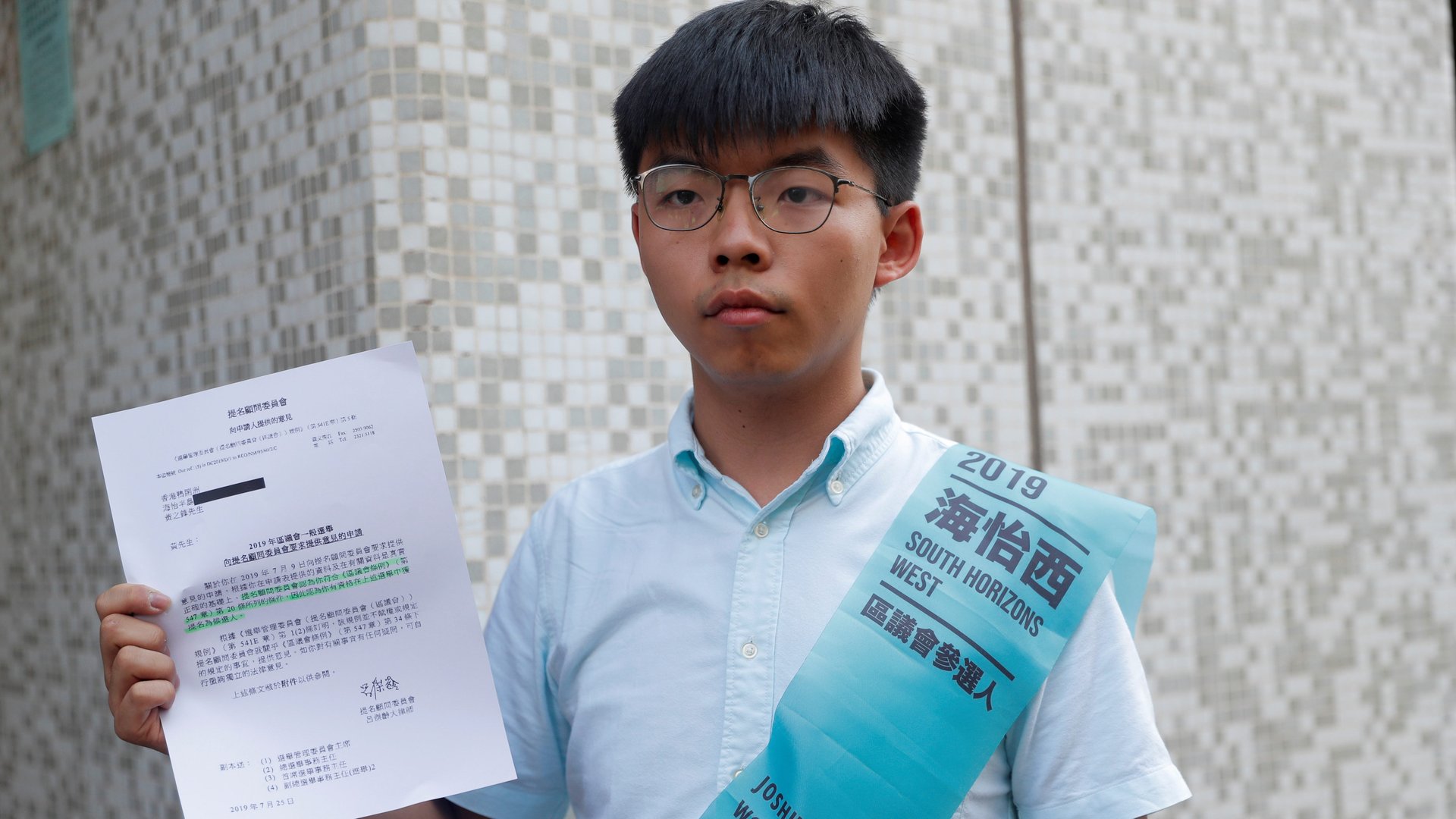Hong Kong just failed Joshua Wong’s stress test of its autonomy
Allowing one of the best-known faces of Hong Kong’s democracy movement to run in upcoming elections in a city racked by five months of protests would have been one easy way for the government to show demonstrators that there’s still room for them to work within the system. But after months of missteps in dealing with public discontent, the government made yet another move that will give the protest movement a fresh shot in the arm.


Allowing one of the best-known faces of Hong Kong’s democracy movement to run in upcoming elections in a city racked by five months of protests would have been one easy way for the government to show demonstrators that there’s still room for them to work within the system. But after months of missteps in dealing with public discontent, the government made yet another move that will give the protest movement a fresh shot in the arm.
In a statement that carefully avoided referring to Joshua Wong, the government on Tuesday (Oct. 29) said that it supported a “Returning Officer’s decision that the nomination of a candidate was invalid.” “If a person advocates or promotes self-determination or independence by any means, he or she cannot possibly uphold the Basic Law or fulfill his or her duties as a (District Council) member,” said the statement, referring to Hong Kong’s mini-constitution.
Wong, who applied on Oct. 4 to run in local elections, is the only one of a record number of 1,104 candidates running for 452 seats to be disqualified.
“There is no question of any political censorship, restriction of the freedom of speech or deprivation of the right to stand for elections as alleged by some members of the community,” the government statement said. But it’s unlikely that will convince many in Hong Kong, who will see the decision as yet another sign of the city’s tarnished autonomy.
Joshua Wong’s decision to run for the District Council elections was seen by many as a way to “stress test” the system, after contenders for legislative elections and victorious lawmakers from the democracy camp have been disqualified in recent years. The anger demonstrated in the 2019 protests, which have been going on for 21 weekends, is in large part due to cynicism that the system is rigged against allowing the city to fully practice even its current limited form of representation.
Wong, who first became prominent as a high school student mobilizing his peers to demonstrate against a government plan to implement mandatory “patriotic education” in schools, was a key leader of the 2014 Umbrella Movement, when protesters occupied major roads across the city for 79 days to demand greater democracy. He was sentenced to prison for his role in the civil disobedience movement, and was freed in June ahead of his scheduled release date.
While Wong hasn’t taken on a leading role in the current leaderless protest movement, which began in June in response to a controversial extradition law, he has been active on the international circuit advocating for protesters’ demands. One of the top items on his agenda has been to push for the US Congress to pass the Hong Kong Human Rights and Democracy Act, a bipartisan bill that would mandate an annual assessment of whether the city is sufficiently autonomous from mainland China to continue enjoying special US trade and economic benefits. The bill, which has passed the US House, would also slap sanctions on Chinese and Hong Kong government officials who suppress freedoms in Hong Kong.
The District Council elections, scheduled for Nov. 24, will elect people who typically focus on day-to-day neighborhood issues like bus service, trash collection, and improvements to public facilities. While district councilors have no legislative power, the race is important in the broader political context because whichever camp clinches the most seats will gain 117 votes in the 1,200-member election committee that selects the next chief executive.